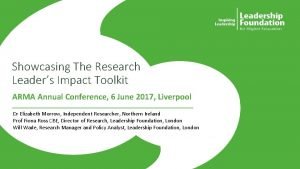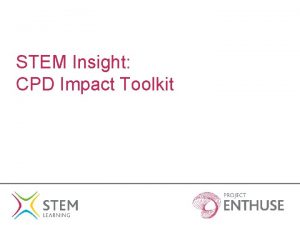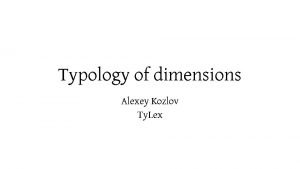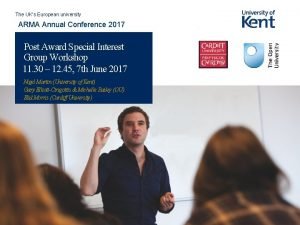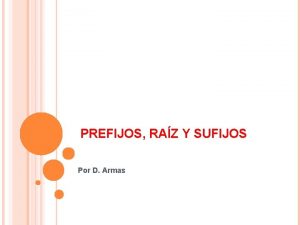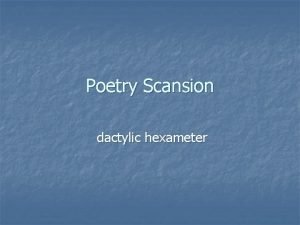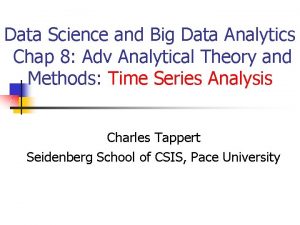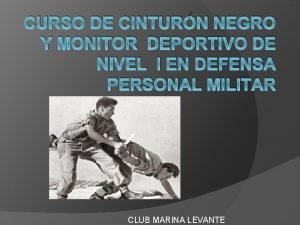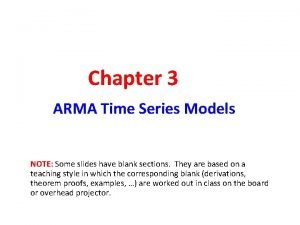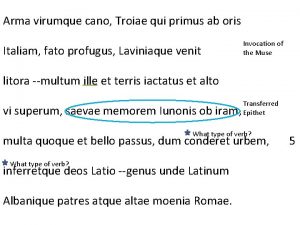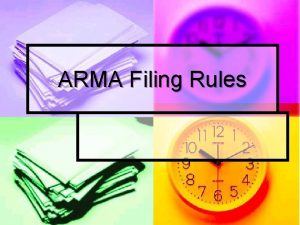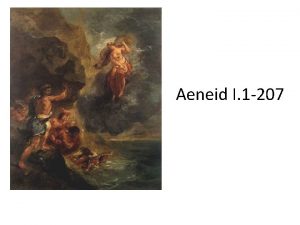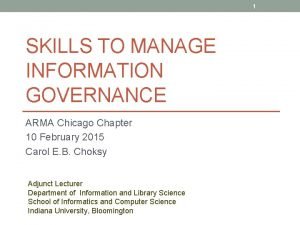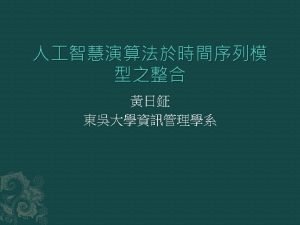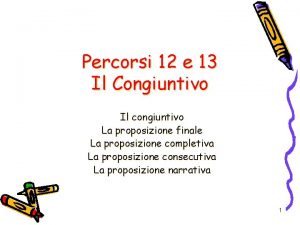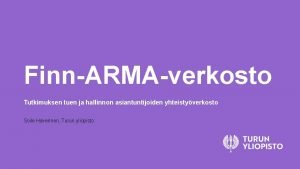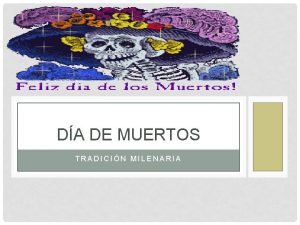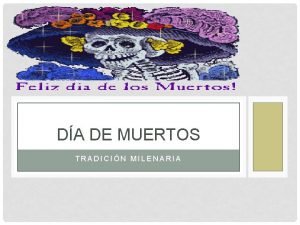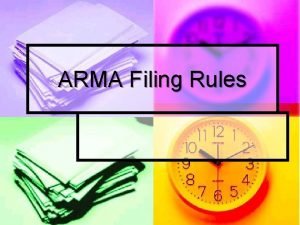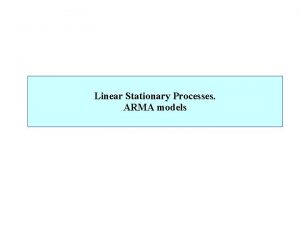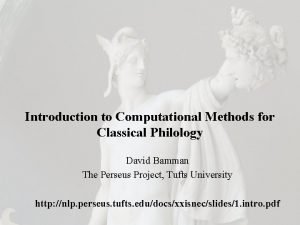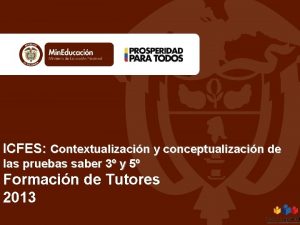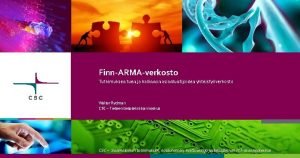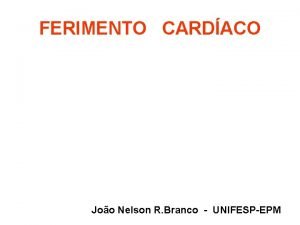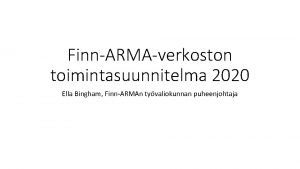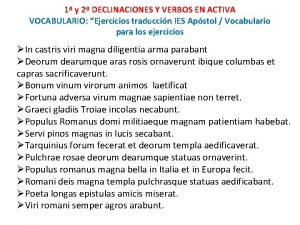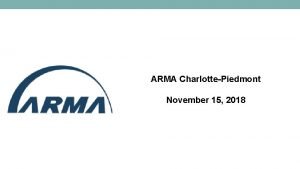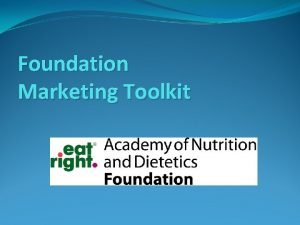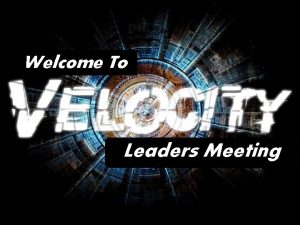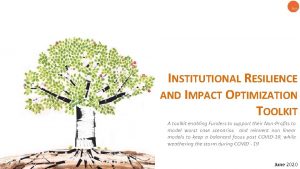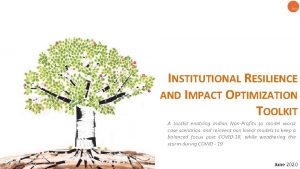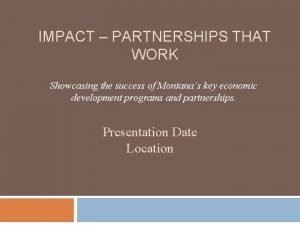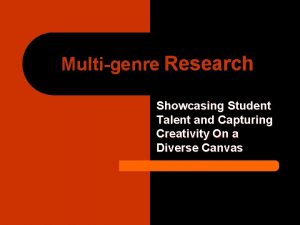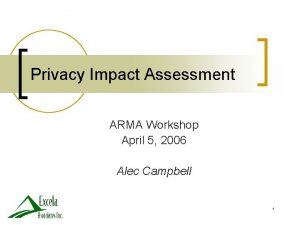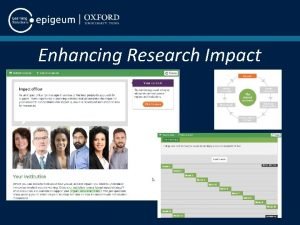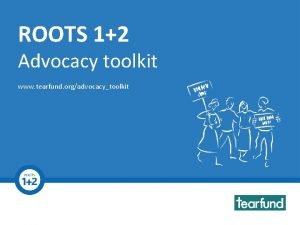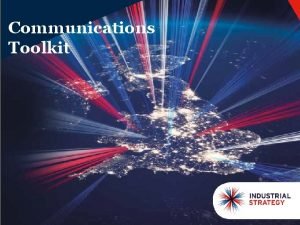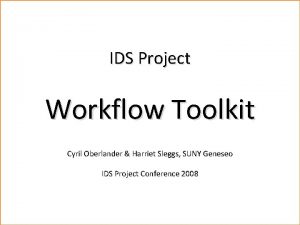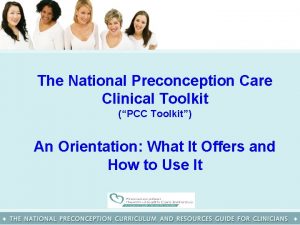Showcasing The Research Leaders Impact Toolkit ARMA Annual































- Slides: 31

Showcasing The Research Leader’s Impact Toolkit ARMA Annual Conference, 6 June 2017, Liverpool Dr Elizabeth Morrow, Independent Researcher, Northern Ireland Prof Fiona Ross CBE, Director of Research, Leadership Foundation, London Will Wade, Research Manager and Policy Analyst, Leadership Foundation, London

Acknowledgements Funded by UK higher education funding councils Academic Learning Partners Dr Jo Allen, Research Impact Officer, University of Brighton Prof Jennifer Ames, Associate Dean (Research, Innovation and Partnerships), Professor of Food and Nutritional Sciences, University of the West of England (now PVC Research at University of South Wales) David Coombe, Director of the Research Division, London School of Economics Dr Chris Hewson, Impact Coordinator, University of Salford Prof Bruce Macfarlane, Professor of Higher Education and Co-Director of Centre for Higher Education at Southampton (CHES), University of Southampton Prof Jo Rycroft-Malone, Pro Vice-Chancellor for Research and Impact, Bangor University Expert reviewers Maeve Lankford, Assistant Director, Membership (Ireland), Leadership Foundation Cindy Vallance, Assistant Director, Membership (London, East & S. East), Leadership Foundation Prof Annette Boaz, Professor in Health Care Research, Centre for Health and Social Care Research, Kingston University and St Georges, University of London Vanessa Cuthill, Director of Research and Enterprise, University of Essex Steven Hill, Head of Research Policy, Hefce Natalie Jones, Senior Portfolio Manager for Knowledge Exchange, ESRC Alison Mitchell, Director of Development, Vitae Prof Alison Tierney, Adjunct Professor, School of Nursing, University of Adelaide, South Australia

Aims of the session Ø Introduce The Research Leader’s Impact Toolkit Ø Focus on leadership and management of research impact Benefits • Maximise impact through coordination, skills development and support • Clearer leadership and management of research impact = increased research capacity, funding and impact

What matters to you? • What interests you? • Why have you come? • What are you hoping to get out of the session?

Overview of the session 1. 2. 3. 4. What impact means and why it matters Purpose of the toolkit and how it was developed Demonstration of the toolkit Examples of how to apply the tools Interactive session, please comment and contribute as we go

What impact means Multiple evolving definitions but most common: “an effect on, change or benefit to the economy, society, culture, public policy or services, health, the environment or quality of life, beyond academia” (REF 2014) In real terms: new goals, practices, incentives and rewards = leadership and management of research impact

Why impact matters

Why impact matters • Showing impact of research on the economy, society, organisations and individuals • Measuring impact: concerns about REF 2021 and responsible metrics (quantitative indicators of impact) • Directing impact: interdisciplinary responses to grand challenges and global problems in a post-truth world • Impact of research process: collaboration, partnerships, stakeholder engagement, public engagement

What matters where you work? In your institution, discipline or department: • What are the drivers for impact? • What types of impact matter most?

Purpose of the toolkit A suite of research-based tools that can be used by higher education institutions to: • develop a formal Research Impact Strategy for 2021 • devise strategies for leading, managing and practicing impact • align impact work with engagement, knowledge exchange, outreach and quality improvement • inform research practice • improve processes and infrastructure • build capacity, skills and knowledge for research careers

Previous research on impact • • 2015 analysis of 1, 309 LGM impact case studies Explored routes to impact

Types of impact TYPE I Use of evidence TYPE II Research products Law Government policy Strategy Regulation Standards Guidelines (recommendations for practice) Priorities (for research or practice) Training program or course Intervention (program or initiative) Toolkit Model Decision aid System (operational) Support network Technology Measure Benchmark Information resource Research method Participation method Teaching method Visual art, music or fiction TYPE III Effect on individuals TYPE IV Effect on groups/organisations Awareness Attitude Understanding (knowledge) Behaviour Knowledge-transfer (intra organisation, inter organisation or network) Organisational development (innovation, new systems or structures) Organisational performance (impact on end-users) • Many types of impact • Timescales • Outcomes and effects

Routes to impact • Complex system with diverse routes to impact • Prospective impact pathways

Identified needs Tools and support for institutions to be - • Proactive: vision, targets, plans, statements and pathways to impact, propagating impact • Dynamic: flexible resource use, linking research to wider contexts, enabling innovation and different routes to impact • Empowering: creating impact cultures, opportunities for reflection, deliberation and learning, exchange of good practice and expertise, building capacity for research impact

What matters to your researchers? • Are researchers engaged? • Do they have guidance and support? • Can they show their impact?

Development of the toolkit Encouraged by funders developed in 2016/2017 Six academic learning partners Building on nine themes identified in previous research Research-based drawing together evidence and best practice (research literature, web trawls, REF research) • Three rounds of refinement of content • Expert review (Hefce, RCUK, vitae, ARMA, impact experts) • Digital design • User testing and demo version • •

Accessing the toolkit • Open access Leadership Foundation resource (www. lfhe. ac. uk) • Versions for desktop, tablet, mobile • Register with My. LF to log in

Menu wheel • Three main themes • Nine sections • User-led navigation • Downloads

45 tools

Directions for users

Linked resources • Section downloads • Editable forms and templates

Any questions or comments …?

Examples of how to apply the tools • Research Impact Strategy • Staff training • Guidance for researchers

Developing a Research Impact Strategy • Useful heuristics and templates

• Tools for visualising and communicating about impact

• Prompts to structure information capture and impact planning

Staff skills and knowledge development • Design and adapt tools for your institution, department or team

Guidance for researchers • Apply best practice guidance

Publications • LSE Impact blog Mining the REF impact case studies for lessons on leadership, governance and management in Higher Education. http: //blogs. lse. ac. uk/impactofsocialsciences/2016/06/08/leadership-governance-andmanagement-research-mining-the-ref-impact-case-studies/ • Hefce blogs Planning and reporting the impact of research. http: //blog. hefce. ac. uk/2016/10/13/planning-and-reportingthe-impact-of-research/ Delivering impact from research needs public participation. http: //blog. hefce. ac. uk/2016/09/14/deliveringimpact-from-research-needs-public-participation/ • Journal article Evaluation (forthcoming) Morrow, Ross & Goreham. Exploring research impact in the assessment of leadership, governance and management research.

What will you take away from this session? • What will you share with colleagues? • What will you remember? • Do you plan to take any action?

Thank you for your time • Access The Research Leader’s Impact Toolkit by registering with the Leadership Foundation at: www. lfhe. ac. uk • Contact information: Dr Elizabeth Morrow: elizabethmmorrow@hotmail. co. uk (@elizabethmmorr 1) Professor Fiona Ross: fiona. ross@lfhe. ac. uk (@Prof. Fiona. Ross) Will Wade: will. wade@lfhe. ac. uk
 How to use toolkit arma 3
How to use toolkit arma 3 Impact toolkit stem
Impact toolkit stem Arma 3 whiteboard dimensions
Arma 3 whiteboard dimensions Arma conference 2017
Arma conference 2017 9 prefijos
9 prefijos Dactylic hexameter example
Dactylic hexameter example Esametro eneide
Esametro eneide Arima vs arma
Arima vs arma Cinturon negro arma blanca
Cinturon negro arma blanca Ma process
Ma process Arma nucleara definitie
Arma nucleara definitie Arma virumque cano troiæ qui primus ab oris
Arma virumque cano troiæ qui primus ab oris Arma filing rules
Arma filing rules Talia iactanti stridens aquilone procella
Talia iactanti stridens aquilone procella Arma information governance
Arma information governance Arma pq
Arma pq Subordinata consecutiva latino
Subordinata consecutiva latino Resmi belgelerdeki mühür arma
Resmi belgelerdeki mühür arma Finarma
Finarma Arma tu ofrenda
Arma tu ofrenda Arma tu ofrenda
Arma tu ofrenda Arma indexing rules
Arma indexing rules Arma
Arma Arma gravi numero violentaque bella parabam
Arma gravi numero violentaque bella parabam Como se arma
Como se arma Arma del reciario
Arma del reciario Ninguna arma forjada
Ninguna arma forjada Ley de filos y langer
Ley de filos y langer Finn-arma
Finn-arma Projétil de arma de fogo
Projétil de arma de fogo Ella bingham
Ella bingham In castris viri magna diligentia arma parabant
In castris viri magna diligentia arma parabant
